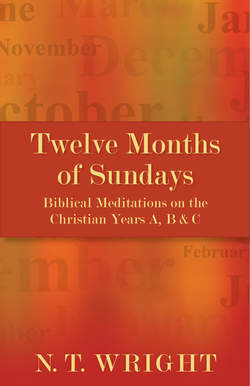Читать книгу Twelve Months of Sundays - N.T. Wright - Страница 20
На сайте Литреса книга снята с продажи.
ОглавлениеThe Fourth Sunday of Epiphany
1 Kings 17.8–16
1 Corinthians 1.18–31
John 2.1–11
The third day; it would be. John does nothing by accident. New creation bursts in upon a village wedding, itself a sign of hope. Wine is to water as the new world is to the old; bubbling up, taking people by surprise, confounding expectations, raising questions, raising the dead.
Other overtones crowd in too. Jewish purification rites belong with the old creation, but Jesus belongs in the new. ‘Woman, what is there between us? My hour has not yet come’; then, when the hour had truly come, ‘Woman, behold your son.’ Jesus’ glory was there already, for those with eyes to see; though they only really acquired such eyes when they saw his glory, crowned as it had been with thorns, on, yes, the third day.
From then on, the challenge was to see that glory in the shame of the cross. The message of the crucified King of the Jews and Lord of the world burst upon an unsuspecting world, not least through Paul’s proclamation, and was a rude shock to the system. Jews were looking for signs of the Kingdom, but what sort of a sign is a crucified King? The pagan world was yearning after wisdom, but what wisdom is there in the stark message that yet another rebel leader has met a messy and untimely end? How can this message contain anything that anyone in their right mind will want to hear? Pour the water into these vessels, though, and then pour it out before the world, and watch it bubble up with transforming power. The gospel, says Paul elsewhere, is God’s saving power, God’s dynamite. Part of its point is precisely that it is, in the world’s eyes, upside down and inside out.
This statement of the gospel’s power to up-end human expectations, set alongside last week’s passage about personality cults among the Corinthian Christians, provides an introduction to the main thrusts of the letter. The Corinthians were eager to turn the rich wine of the gospel back into water again, back into another version of the philosophies they were used to. Paul will have none of it. Unless the stewards at the feast are looking astonished, the party hasn’t really begun. Unless the wrong people are crowding into the kingdom, it isn’t God’s Kingdom. If it’s wine you want, pour water from these vessels. If it’s boasting you want, boast of the Lord – Jesus, the vessel that contains all wisdom, and all else besides.
Elijah’s multiplication of meal and oil, like Jesus’ remarkable multiplications and transformations, was not just a matter of providing for people in need. It was a sign of hope, of new creation, at a time of famine and drought. More: as Jesus himself would indicate in Luke 4, it was a sign that God was at work beyond the borders of Israel. New life was bursting out all over the place. But it took faith to see it. ‘Make me a little cake first.’ Now there’s a challenge.
